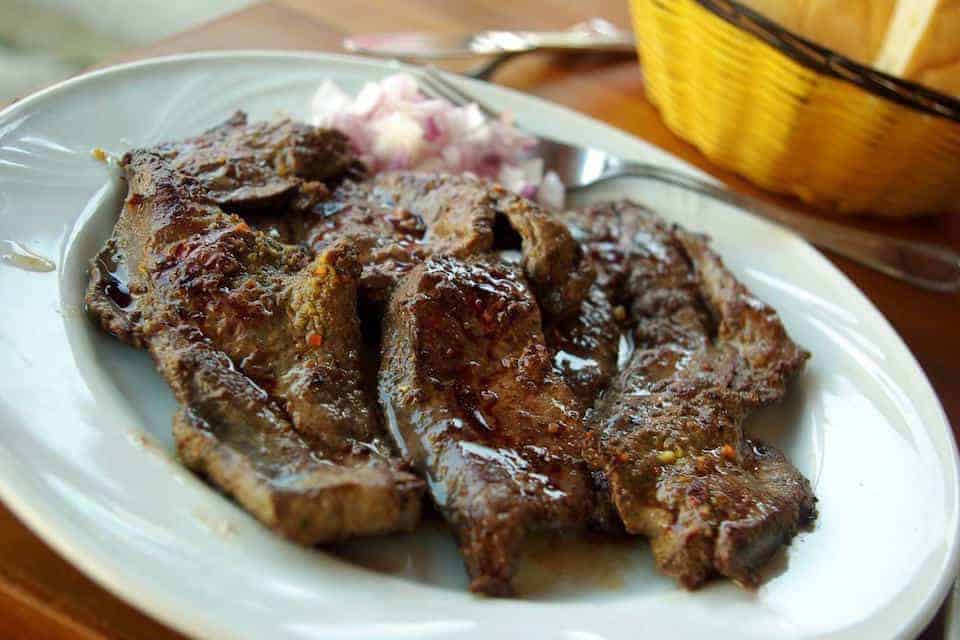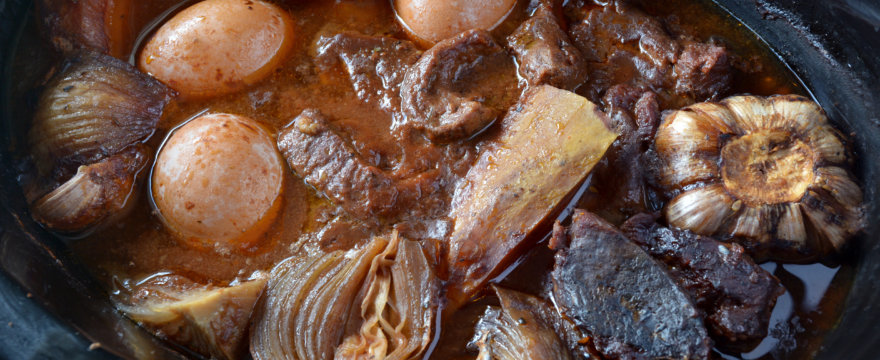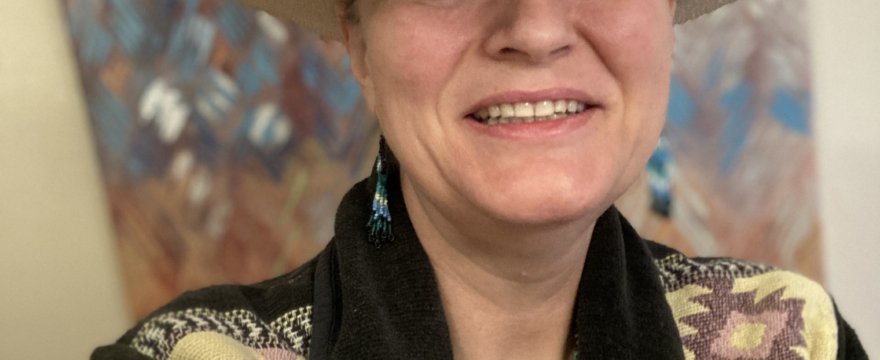What foods are richest in vitamin B12? We made the following list for you.
However, please note that most B12 deficiency cases have nothing to do with low vitamin B12 consumption, but everything to do with B12 malabsorption. The main causes are pernicious anemia and food-bound cobalamin malabsorption, with the latter being the predominant cause of B12 deficiency in the elderly.
In pernicious anemia, antibodies prevent the gut from using B12. It is a more complete type of malabsorption, where B12 shots are needed for life, to avoid the inevitable nerve and brain damage. B12-rich foods or oral supplements won’t work.
In food-cobalamin malabsorption, the body is unable to release B12 from food, often due to low gastric acid production. Unlike in pernicious anemia, these patients can fully absorb the free crystalline form of B12 found in oral tablets or fortified foods.
But even though most B12 deficiencies are not the result of low intake, some folks genuinely don’t consume enough B12, primarily plant-based eaters:
Higher rates of deficiency were reported among vegans compared with vegetarians and among individuals who had adhered to a vegetarian diet since birth compared with those who had adopted such a diet later in life. The main finding of this review is that vegetarians develop B12 depletion or deficiency regardless of demographic characteristics, place of residency, age, or type of vegetarian diet. Vegetarians should thus take preventive measures to ensure adequate intake of this vitamin, including regular consumption of supplements containing B12.
How Prevalent Is Vitamin B(12) Deficiency Among Vegetarians?
Dr. Roxanne Sokol of Cleveland Clinic’s Wellness Enterprise says:
When I test vegans for B12, they’re usually on the low side—if not deficient.
Vitamin B12 Foods List
Here’s a dietary list of the richest sources of B12. Obviously there are other foods containing B12, but these are the ones sporting the highest concentrations:
- Clams. 99µg per 100g. One clam contains 9.5µg (395% of the recommended daily allowance, which is ~2.4µg). Clams are by far the richest vitamin B12 source.
- Liver. Nature’s most potent multi-vitamin. The liver of ruminants (beef, lamb, moose, etc) is a powerful B12-rich food. Of these, lamb liver is the king, providing 86µg per 100g when cooked. Poultry liver is also great, as turkey, duck, and goose, when cooked over a pan, all contain around 60µg per 100g. Chicken liver contains about a third of that, but it’s still plenty. What if you want both B12 and folate? Liver is rich in both! Beef more so in B12, chicken more so in folate.
- Kidneys. Lamb kidney is a rich B12 source, providing 79µg per 100g when braised. The next best are veal and beef kidneys, providing about half of that.
- Caviar. Whitefish eggs provide 56µg per 100g. Black and red caviars, in contrast, provide 20µg per 100g (same as chicken liver).
- Octopus. Cooked octopus contains 36µg per 100g.
- Oysters. Some of the world’s richest natural sources of B12. Depending on the species, expect to get between 25-35µg of B12 per 100g.
- Mussels. Blue cooked mussels (the most common type) contain 24µg of B12 per 100g. All other species provide respectable amounts as well.
- Fish. Mackerel and herring are the two species richest in vitamin B12, providing 19µg per 100g. In comparison, salmon provides ~3µg.
- Crabs. The Alaskan King crab has 11.5µg of B12 per 100g, so an average leg (135g) will provide you with 15.5µg (645% of the RDA). The Dungeness and Queen crabs contain similar amounts. Blue crabs, in comparison, provide only ~7µg.

No Other B12 Food Sources?
Plenty other! Eggs, meat, fish, cheese, lobster, scallop, shrimp, pretty much every animal-based product will have B12. They may not be the richest, but does it matter? We need very little B12 every day (the recommended daily intake is about 2-3µg). As long as you eat animal products on a regular basis, you should be getting enough.
What foods contain vitamin B12 if you’re vegetarian? Eggs, cheese, and especially fish and shellfish, if you can eat them. Eggs and cheese by themselves don’t always suffice, so we do recommend all vegetarians supplement with methyl B12 tablets. Vegetarians tend to have lower levels of B12 than omnivores, so it’s better to be on the safe side.
What’s a Vegan to Do?
There are virtually no vegan foods high in B12. Unfortunately, many vegans are not aware of it. Vegan guru Dr. McDougall recommends a vegan diet based on starch, vegetables, and fruits, and makes it seem as if B12 is a small issue:
To avoid the extremely rare chance of becoming a national headline, add a reliable B12 supplement.
Dr. T. Colin Campbell, author of the famous China Study, similarly says:
If you do not eat any animal products for three years or more, or are pregnant or breastfeeding, you should consider taking a small B12 supplement on occasion.
This is irresponsible and misleading. The chance is not “extremely rare”, and all vegans should supplement with B12 on a regular basis:
Thus, with few exceptions, the reviewed studies documented relatively high deficiency prevalence among vegetarians. Vegans who do not ingest vitamin B12 supplements were found to be at especially high risk. Vegetarians, especially vegans, should give strong consideration to the use of vitamin B12 supplements to ensure adequate vitamin B12 intake.
The Prevalence of Cobalamin Deficiency Among Vegetarians Assessed by Serum Vitamin B12: A Review of Literature
Studies consistently show that vegans have much lower levels of B12 than vegetarians, who have lower B12 levels than omnivores:
Mean serum vitamin B12 was highest among omnivores, intermediate among vegetarians and lowest among vegans . In all, 52% of vegans, 7% of vegetarians and one omnivore were classified as vitamin B12 deficient.
Serum Concentrations of Vitamin B12 and Folate in British Male Omnivores, Vegetarians and Vegans: Results From a Cross-Sectional Analysis of the EPIC-Oxford Cohort Study
Nevertheless, the data are compelling, and they indicate that vegetarians should routinely take cobalamin or vitamin B-12 supplements, which in their generic form are relatively inexpensive. In developing countries, other formidable problems were incurred in attempts to implement a program of supplementation of other vitamins (50). Yet the lack of a comprehensive initiative to protect vegetarians from vitamin B-12 deficiency can lead to a whole generation of cobalamin-deficient children (and adults) who are incapable of making good decisions because of the additional burden of neurologic deficits induced by cobalamin deficiency. The international nutrition community must take up the challenge posed by this body of evidence and enact practical steps to ensure parity in the vitamin B-12 status of vegetarians and omnivores.
Vegetarianism and vitamin B-12 (cobalamin) deficiency
Where does B12 come from?
Animals do not actually create B12.
B12 is unique, because it’s the only vitamin that contains a trace element, cobalt. Cobalt is found in grass and soil, where bacteria feed on it. Herbivore animals eat the grass, and that bacteria starts multiplying in their stomach, producing B12. A similar process happens in the ocean’s food chain.
Plants don’t need vitamin B12, so they don’t store it. Yes, some algae like spirulina contain B12, but it’s inactive B12 analogues called cobamides that may interfere with B12 activity and increase the need for real, active B12.
So, what’s a vegan to do?
If you don’t have any absorption issues, then methylcobalamin tablets may work well. Although I would like to suggest to consider another route:
Bivalveganism. To be more specific – oyster veganism:
Oysters may be animals, but even the strictest ethicist should feel comfortable eating them by the boatload … Biologically, oysters are not in the plant kingdom, but when it comes to ethical eating, they are almost indistinguishable from plants.
Bivalveganism could solve a lot of the problems vegans face. Clams, mussels and oysters are the most eco-sustainable, and are loaded with nutrition that’s often lacking in vegans, especially B12. Remember how high they were on our list of foods with a lot of B12? They also contains retinol, the true, most bioavailable form of vitamin A.
From an ethical standpoint, bivalves are similar to plants. They don’t have a central nervous system as we know it, and are therefore not considered sentient (“able to perceive or feel things”). And did we say they make for rich vitamin B12 foods? Just one oyster a day will do wonders, and give you all the B12 levels you need.
All the best.

